 During the 1980s and throughout the early ’90s, Vector, a California-based car company, manufactured the exotic supercar that was considered to be America’s first. The car in question was Vector Aeromotive’s Lamborghini look-a-like, the W8. A brainchild creation conceived by the mind of Jerry Weigert, who at that time was a recent college graduate and eventually the founder of Vehicle Design Force, the W8 lasted from 1989 till ’93, and was originally intended to be Mercedes-powered.
During the 1980s and throughout the early ’90s, Vector, a California-based car company, manufactured the exotic supercar that was considered to be America’s first. The car in question was Vector Aeromotive’s Lamborghini look-a-like, the W8. A brainchild creation conceived by the mind of Jerry Weigert, who at that time was a recent college graduate and eventually the founder of Vehicle Design Force, the W8 lasted from 1989 till ’93, and was originally intended to be Mercedes-powered.
Sadly, the Vector car company was moved to Florida from the West Coast before the entire operation folded, but the 600-horse W8 and its predecessor, the W2, became America’s first true attempt at establishing that delicate balance between raw power and advanced aerodynamics. One of the world’s few Vector specimens was housed for years at Los Angeles’ Petersen Automotive Museum, and that specific example belonged to an Arab prince.
Because some of the Middle East’s sweetest rides are the Vector and Lamborghini supercars most identified as one of the “perks of princehood,” such has become a stigma behind the motoring enthusiasts of the region. This is why, at least culturally-speaking, Lebanon’s “Muscle Car Invasion” has become not only one of the biggest, but one of the most important motoring venues to hit the Middle East.
Lebanon’s Muscle Car Invasion not only brings cool iron to the region, but it also serves to bridge some very important cultural “gaps,” as the people of Lebanon have stated that years of war and division have not stopped them from enjoying the very best in homesoil horsepower.
As CarBuzz points-out, the American motoring venue abroad is not only unique in being the Mid East’s largest. In fact, with what one spectator describes as a “humble” participant stat of some 3,600 club members, Muscle Car Invasion offers enthusiasts the chance to enjoy an automotive platform that is far more doable than that associated with Abu Dhabi and Saudi Arabia’s wealthy elite.
Not everyone in the Middle East is driving a Ferrari or McLaren, but what does Lebanon’s preoccupation with Detroit muscle say about American muscle’s impact on the international market?





















